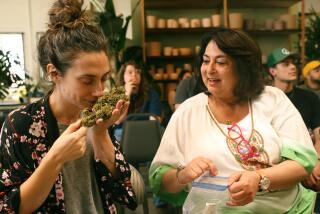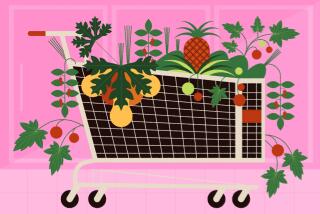Sowing the Seeds for the Vegetables of Summer : Options run from the juicy tomatoes and melons, to the crunchy corn and bell peppers. Now is the time to plant.
As we make the inevitable march toward summertime, veggie gardeners are busy. The time has arrived to sow the garden beds--that all important first step to enjoying a bountiful harvest during the dog days.
Cool weather crops--like broccoli, some leafy greens and root vegetables--have by now gone the way of all things to make room for the succulent vegetables of summer. Here, your options run from the juicy bonanza of tomatoes and melons, to the crunch of corn and bell peppers. Even herbs, such as basil, can be planted right now.
Area nurseries and garden shops are well-stocked with seasonal supplies to fulfill your gardening needs and get you planting pronto.
There are two options: sow your garden with seeds or seedlings--tiny vegetable varieties that are pre-sprouted and ready to plug into the soil.
Though it’s somewhat more economical to purchase seeds, the already-sprouted version offers advantages to those of us with less than green thumbs.
Essentially, you can expect to pay about $1 to $2 for one of those small packages of seeds, depending on the vegetable variety. Compare that with a single 4-inch baby plant, which will run $1.29 to $1.49. A pack of six--containing young plants much smaller than 4-inches--are running from 79 cents to $1.
A six-plant “jumbo pack”--with larger plants--is about $2.50. Prices, of course, vary depending on the variety and where you make your purchase. Often more favorable prices can be found at the large discount stores.
So what is the big difference between seed vs. seedling, besides cost?
Some plants prove more difficult to germinate, said Marty Martinez of Baron Bros. Nursery in Camarillo.
“Some of the more heartier plants--like squash, melons and corn--can be planted from seed and will be just fine,” Martinez said.
Ventura County grower John Wooten--who sells his plants at the Ventura (Saturday) and Thousand Oaks (Thursday) farmers markets--suggested the following summertime favorites should be grown from starter plants: bell peppers, tomatoes and eggplant.
Zucchini and green beans will do just fine by seed, Wooten said. “These kinds of vegetables are very easy to start from seed and usually the plants will actually be better,” he said.
If you decide on growing from seed, you need to get started right away to provide the seeds the best chance of successful germination, Martinez said. “It’s a good idea to plant before it gets too warm,” he added.
And those living along the coast will be happy to know that they have a good chance of succeeding with a great variety of plants.
“Along the coastal areas you can plant just about anything this time of year,” said Wooten. “It’s generally cool enough to grow cool weather crops and warm enough to grow summer vegetables.”
So don’t be afraid to plant the head lettuces, cabbages, broccoli and the like, he said.
Details
When sowing seeds, be sure to pay careful attention to your planting method. Following are some tips to help ensure your seeds germinate and thrive up until harvest time.
* SEEDS: Never plant your seeds too deeply; a plant will die before breaking the surface. The directions on the package should provide the correct depth. However, if your garden consists of heavy soil, you may want to actually plant more shallow. Seeds should not be pushed into the soil, but covered gently.
* SOIL: Soil should be moist, loose, well-worked and enriched with organic materials. Be careful when watering, you don’t want to wash away the seeds.
* NAME BRANDS: According to Marty Martinez of Baron Bros. Nursery in Camarillo, common, good-quality seed types generally seen in most nurseries include Burpee, Stover and Northrop King. “Most seed quality is all pretty good,” he said. “There’s really nothing to be leery about seeds. Just make sure you check the expiration date on the package.”






